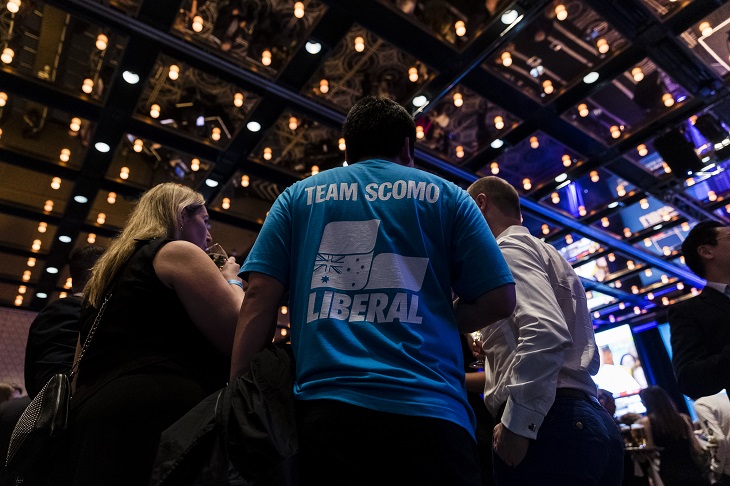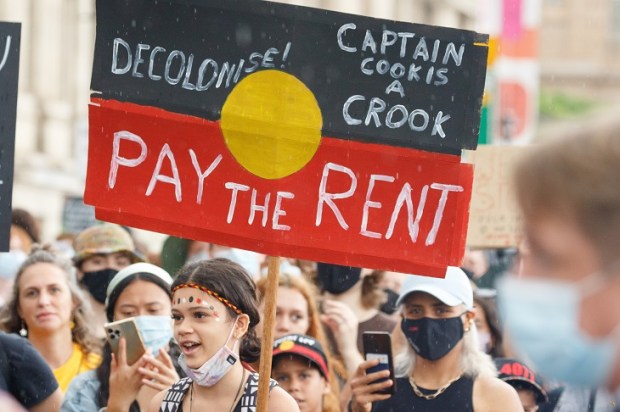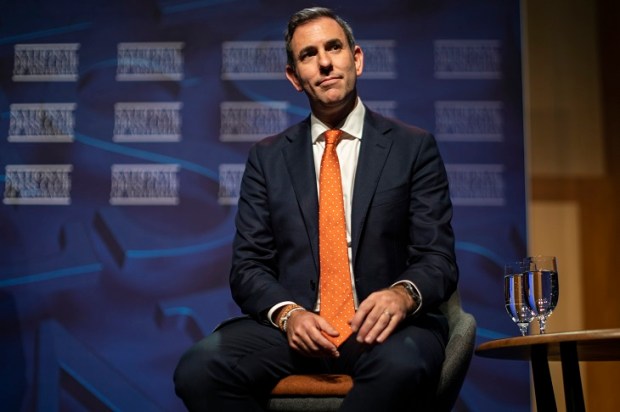A quarter of a century ago, John Howard said he wanted Australians to be comfortable and relaxed about their history, their present, and their future.
Howard’s remarks were righteous and timely. Under the Keating government, Australians had come to resent being tarred with a black armband view of their history. They had sacrificed to embrace necessary reforms, but tolerance for the concurrent rise of a new cultural zeitgeist dictated from Canberra was exhausted.
‘Comfortable and relaxed’ was a superb political posture for 1996. At the time, Howard correctly divined that Australia needed a government of cultural respite.
It was necessary balm for a weary national psyche. Australia breathed easy, looked forward confidently, and trusted in the vital economic reforms that underpinned the Howard government’s 12 years of extraordinary success.
That success, or rather, its consequence, has mortally endangered Australian conservatism.
A generation on from that great government, Australia’s conservative polity is still struggling to define itself, despite its parties holding office nationally and in our most populous state.
Many Australians have been shaken by the shift to radical big government in the age of Covid. They are worried – rightly – about the future of their country.
Once reliable constituencies of the centre-right threaten to shatter, and voters want to know; just how did we get here?
To be sure, we got too comfortable, and far too relaxed.
In 2008, Australians supportive of a conservative agenda relaxed to the point of boredom. Howard was turfed because … well, just … because?!
The wellspring of Australian Conservative thought wasn’t renewed at that time, because with no compelling reason to lose office, there was no prerogative to search beyond a superficial accounting for that loss.
Worse, Australia’s conservatives then faced an opponent so poor in Rudd-Gillard Labor, there was scarcely time to scaffold the necessary rebuild before regaining office.
When government came, instead of re-entering the arena with a revitalised spirit, much of Australia’s broader conservative movement sat bemused as Tony Abbott, their most ideologically authentic leader, entered battle furiously – and largely alone.
Abbott was valiant, but no general can long withstand treachery in the ranks.
Malcolm Turnbull (a man as conservative as a frat house full of Marxists) winning reward for his treachery should have telegraphed loudly and clearly that post-Howard, Australia’s conservative milieu had grown comfortable in its delinquency toward an authentic national ambition.
A hop to despatch Rudd redux, a skip to Morrison, a gleeful jump over the carcass of Bill Shorten, and there we arrived in the Pandemic Age. Comfortable. Relaxed. Just as we knew how.
Comfort’s curse is its concomitant laziness. Laziness begets sloth. In sloth, as Ecclesiastes tells us, ‘The building decayeth … the house droppeth through.’
Has the conservative house dropped through in Australia?
The rafters are certainly splintering.
The libertarian-inclined have concluded that it is beyond repair. Many have decamped to greener pastures.
Fiscal conservatives are still in the grief stage of mourning, and will likely move on to anger by the time they reach the ballot box.
Families ripped apart by the effective nullification of their children’s passports will likely never forgive the Prime Minister. Their votes could go anywhere.
Still, we can not say conservatism has collapsed in Australia, because it has not collapsed in the western world of which Australia is a vital constituent. Conservative thought is thriving, but its centres of gravity lie in mainland Europe and in the southern United States.
The house of Australian conservatism however, is most certainly in dire need of repair. Its betrayals have been many. Most urgently, it needs awakening from the apathy which has disabled its sentries and let the barbarians in.
Where now lies the sacred inheritance birthed by Burke, passed through British common law, synthesised with American moral rectitude, and embraced and despatched by Australian conservative leaders for generations?
Why, when facing the unknown in a pandemic, did our government not have the courage to step calmly off the zeitgeist wicket of ‘Shutdown & Spend?’
Why, when the ‘unknowns’ became ‘knowns’, did they not then revert to a conservative prudential norm?
Why did the Prime Minister – not a King, not a President, but merely first among equals – not face ferocious blowback from his purportedly compassionate, freedom-loving backbench, on account of draconian, illiberal border policies?
How did we allow our society to devolve into a popularly-endorsed medical apartheid state, on the say-so of a scared, myopic bureaucratic class?
We the people can not answer these questions easily. It follows that Australia’s conservative movement – separately to its representative governing parties – is in need of a reformation.
I have not used the words Liberal or National on this page thus far, because such a reformation requires the imprimatur of neither party, and in fact, would be hobbled by a dependency on any political machine.
Precedent to the success of their political parties, there lie three foundational pillars which must support a thriving national conservative movement; those of Intellect, Institution, and Issue.
Firstly, and most pressingly, to Intellect.
Conservative thought is thriving in America and Europe because of an increasing investment in its intellectual tradition. Modern-day conservatives in Europe and the United States are committed to deep thought about their political telos.
Faced with obliteration by unhinged opponents hell-bent on civilisational self-immolation, their crisis has been necessarily more existential than our own.
In response, the Euro-American conservatives have correctly grasped the nature of their project, and that the cultivation of the conservative spirit must begin anew at the dinner table, grow through civic duty, and flourish in communal subsets. In Burkean parlance, it must first thrive within the ‘little platoons’.
At a national level, this care for the intellect needs to be carried by the second pillar – institutions. We have a multitude of good centre-right institutions already. But they must recruit, expand and multiply.
Further, they must come together in conference more regularly, to debate and strength-test their solutions to our various national crises.
Many of the most important debates concerning the future of the free world are today happening under the banner of the newly founded Euro-American Edmund Burke Foundation, at their ‘National Conservatism’ conferences. These are multi-constituency events, with a diversity of viewpoints, and a disposition toward rigorous public cross-examination.
Australia has done well to secure a headline CPAC event, and our leading think tanks already host many excellent forums of discussion. However, in order for the grassroots to effectively steer the parties (rather than the reverse), the commitment to public debate must increase dramatically.
Conservative argument outside of party in this manner is critical to avoiding the later political disunity which can manifest in terrible electoral outcomes for an otherwise broadly-aligned coalition.
Finally, intellect and institution must serve as a vessel for the third pillar – issues. These are many and various, but as we awake from the Covidian coma, I propose five precepts of paramount importance:
- That free enterprise, and the voluntary nature of society, are paramount to the essential agency of all Australians.
- That our contemporary addiction to debt equates to inter-generational theft, and is thus a moral crime.
- That all policy must be family policy.
- That it is right and prudent to drive an ongoing, public refutation of totalitarian and communist ideologies, particularly that of the Chinese Communist Party, which poses the gravest threat to our enduring freedom and prosperity.
- That in light of the former, we must undertake the radical and necessary transformation of our national defences.
These are the issues which, by nature, conservatives can support most effectively. They are also the issues to which we are most historically obligated, and by which we will be most stridently judged.
With the three precedent pillars fortified, the parties of government may join as the fourth and final, and the house may stand. Aiming for perpetual re-election without such foundation is not only reckless to our cause, but a danger to the national interest.
There will be future national emergencies and they will be exponentially more severe than the present-day virus. A future conservative government must be prepared to meet them. We must not see a repeat of the Covid era’s terrible abdications – abdications bred by a decade of moral and philosophical dereliction.
‘Comfortable and relaxed’ was the tonic for the times in 1996, but it will not suffice as a posture for Conservative Australia’s next successful period of government.
‘Prudent and prepared’ must instead be the guiding principle and the light by which any Australian conservative movement travels into the future.
Ben Crocker is currently Ramsay Centre for Western Civilisation scholar in Washington DC. Substack: Crocker’s Columns (Politics, History, Classical Music, Literature). @RealBenCrocker
Got something to add? Join the discussion and comment below.
Get 10 issues for just $10
Subscribe to The Spectator Australia today for the next 10 magazine issues, plus full online access, for just $10.

























Comments
Don't miss out
Join the conversation with other Spectator Australia readers. Subscribe to leave a comment.
SUBSCRIBEAlready a subscriber? Log in